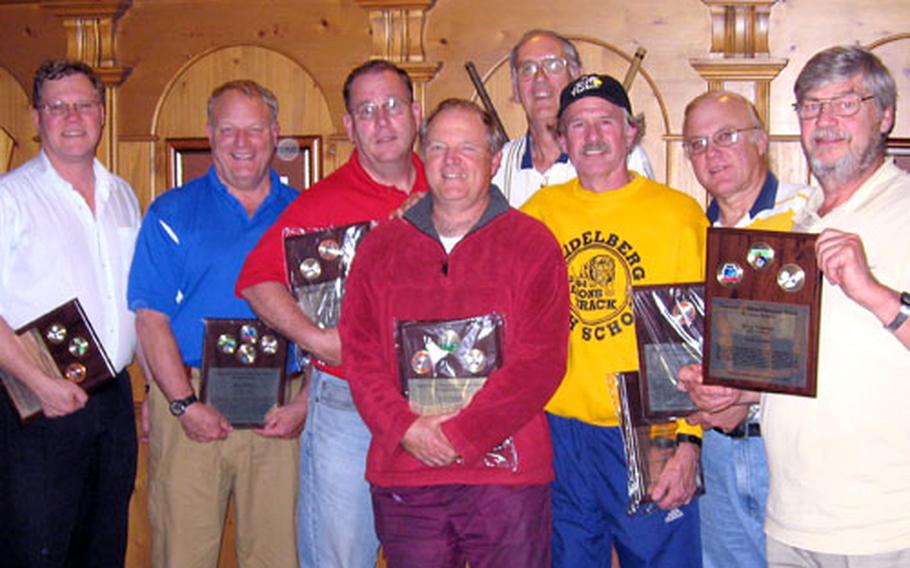
Retiring DODDS-Europe high school coaches hold the plaques they received last month at Rheinblick Golf Course, near Wiesbaden, Germany. (Courtesy of Tom Richards)
Talk about a rebuilding job. DODDS-Europe has some big holes to fill in the coaching ranks.
Rich Bennett and Wes Sisson of Heidelberg, Burt Blank of Mannheim, Jack Dougan of Baumholder, Ted Marr of Ansbach and Ross Calvert, Mike Kennedy and Doug Sommer of Bitburg retired at the end of this school year, taking with them a total of 232 years of athletic experience in DODDS.
Most of those careers, an average of 27 years each, dated back to the heyday of DODDS sports in Europe. That was the Cold War era when nearly 60 high schools competed for titles. Those titles meant even more considering teams fielded players like of Mannheim’s Kevin Green, who went on to star in the NFL; Würzburg’s Mike Brown, who now coaches the Cleveland Cavaliers of the NBA; or Shaquille O’Neal, who as a 6-foot-9 freshman at Fulda caused jaws to drop.
All that changed with the 1990s drawdown that accompanied the West’s Cold War victory. Now, with only 32 DODDS schools competing, the talent pool isn’t nearly as deep.
“Frankfurt had 1,100 students and didn’t even count freshman, and Kaiserslautern had 1,800,” recalled Blank, who began his 16 years as head or assistant football coach for Mannheim in 1981 and also coached the Lady Bison basketball team for 12 years.
“We used to say in basketball that you had to have three good players to have a chance to win a championship. Now, if you have one good player, you’re in it.”
Bennett, who attended Heidelberg for four years and worked at Mannheim before returning to his alma mater in 1980 to coach volleyball, basketball and track, noticed the change, too.
“Back in the ’80s, we had two guys from Heidelberg go to the NFL (linebacker Ron George and quarterback Eric Zeier),” he said. “We had a lot more to choose from. If you look at the basketball team pictures, you’ll see a lot of tall guys in them.”
With less talent, the teams don’t measure up to the past, he added. “It’s not as competitive now,” he said. “Now, when you win a championship, it’s watered down.”
Added Marr, who coached boys basketball for 31 years at Ansbach, “As the schools got smaller, it became harder to maintain the program. Back then, we had to cut people and had large JV programs. As the enrollment shrank, we had to give up JV.”
Calvert, who coached football, wrestling and track at SHAPE, Incirlik, AFCENT (now AFNORTH) and Berlin before closing out his career at Bitburg as the Barons’ athletic director, noticed a change in attitude that further drained the talent pool.
“Kids have other interests,” he said. “Once you could dangle the prospect of wearing a letter jacket in front of a kid and he’d come out. Now, they don’t seem as interested in athletics.”
Even some of those who do participate are a different breed, said Heidelberg’s Sisson, who arrived to coach basketball and volleyball in 1978 and who has been athletic director for the Lions since 1993.
“Kids are probably more athletic today, but they have a tendency to be not as concerned with the team as with individual success,” he said.
Even though the base is shrinking, most of the retirees saw no impediment to a continuing DODDS sports program.
“There’s an emotional commitment from DODDS to the military command to make it not so disruptive for a kid to come over here,” Calvert said. “They’ll find the resources to keep it going.”
Added Marr, “We’re committed to giving kids an opportunity. We’re always looking for ways to make it happen.”
Marr spoke for the majority when he called coaching for DODDS a satisfying assignment — especially the travel.
“We’d play in Berlin and stay at a hotel in the Wannsee,” he recalled. “We’d be sitting in a room and someone would say, ‘In this room, the decision on the Final Solution was made.’
“It takes your breath away to be that close to history.”
Summarized Calvert: “It was always rewarding. You don’t get the same reinforcement in the classroom as you do in coaching. In class, there are students who don’t want to be there. In athletics, everyone wants to be there."
Including himself, for every one of those 32 years.
“It was a wonderful experience,” he said. “Any educator will tell you that you get a certain amount of energy just being around kids.”